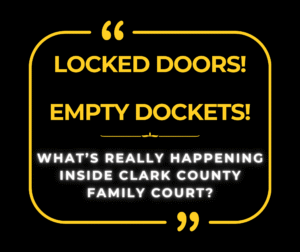Press Release
By Veterans In Politics Court Observation Team
October 10, 2025 – Las Vegas, Nevada
Las Vegas, NV — On Thursday, October 9, 2025, court observer Frank Friends from the Veterans In Politics Court Observation Team arrived at the Clark County Family Court at 8:00 a.m. to conduct a routine observation. What he discovered instead raised serious questions about transparency, accountability, and the state of our public court system.
Locked Doors in a Public Courthouse
Several family courtrooms were found locked—in clear violation of open court policy. Family Court proceedings are public by law, and the locking of courtroom doors without justification denies citizens their constitutional right to observe the administration of justice.
Courtrooms observed with locked doors included those of Judge Bill Henderson (Courtroom 1), Judge Mari Parladé (Courtroom 2), Judge Sunny Bailey (Courtroom 7), and Judge Pickard (Courtroom 12).
A marshal from Judge Pickard’s courtroom stated the public would be allowed in only when a case was in session. That explanation falls short of judicial transparency standards. Courtrooms should never be locked during business hours, as open access is the cornerstone of public confidence in the judiciary.
Sealed Cases Must Still Be Identifiable
While sealed cases are sometimes necessary to protect sensitive information, the public must still be aware that a case exists. Observers noted that Courtrooms 20 and 22 listed “sealed cases,” but many dockets simply appeared empty—leaving no indication of scheduled hearings.
Veterans In Politics urges the court administration to ensure that sealed cases are clearly marked on the docket, showing the time and case number (without names) to maintain transparency while protecting privacy.
Empty Dockets vs. “Overloaded” Judges
Judges in Family Court often cite heavy caseloads and long delays as reasons why hearings take months to schedule. Yet, on October 9th, many dockets were shockingly light — and some had no cases at all.
Below is a summary of what our observer found that morning:
-
Judge Regina McConnell (Courtroom 4): 2 cases (9:00 a.m. and 10:00 a.m.)
-
Judge Bill Henderson (Courtroom 1): 3 cases, door locked
-
Judge Mari Parladé (Courtroom 2): 4 cases, door locked
-
Judge Kerri Maxey (Courtroom 3): 1 case (1:30 p.m.)
-
Judge Dee Butler (Courtroom 5): 4 cases starting at 10:00 a.m.
-
Judge Shell Mercer (Courtroom 6): 2 cases (10:00 a.m. and 2:00 p.m.)
-
Judge Sunny Bailey (Courtroom 7): 2-page docket, door locked
-
Judge David Gibson Jr. (Courtroom 9): 1 case (1:30 p.m.)
-
Judge Rhonda Forsberg (Courtroom 10): No cases
-
Judge Robert Teuton (Courtroom 11): 11–13 cases starting at 2:30 p.m.
-
Judge Pickard (Courtroom 12): 3-page docket, door locked, no cases called while observer was present
-
Judge Giuliani (Courtroom 13): 5 cases
-
Judge Ricon-White (Courtroom 14): 5 cases starting at 10:00 a.m.
-
Judge Vincent Ochoa (Courtroom 21): No docket
-
Judge Mary Perry (Courtroom 23): No docket
-
Judge Hoskins (Courtroom 24): 3 cases; only open and observed courtroom
If judges are truly overwhelmed, why do so many dockets show only a handful of cases—or none at all?
Public trust requires that the judiciary’s claims of “overload” align with actual case activity. Empty dockets and locked doors suggest otherwise.
A Positive Example of Fairness
Not all findings were negative. In Judge Hoskins’ courtroom, observers witnessed a model of judicial professionalism. Judge Hoskins encouraged both attorneys to resolve their disputes without unnecessary hearings or expenses, focusing on fairness and efficiency. This shows that true leadership in the courtroom can reduce conflict, save resources, and restore faith in the judicial process.
A Call for Reform
Veterans In Politics calls on the Clark County Family Court and the Nevada Administrative Office of the Courts to immediately:
-
Enforce open court policies – No public courtroom should ever be locked.
-
Ensure transparency for sealed cases – All dockets must reflect the existence of sealed matters.
-
Audit court workloads and scheduling – Determine whether judicial resources are being fully utilized.
-
Encourage ongoing public oversight – Court observation should be welcomed, not restricted.
Justice must not only be done — it must be seen to be done.
About Veterans In Politics International (VIPI)
Veterans In Politics International (VIPI) is a non-partisan organization dedicated to ensuring integrity, transparency, and accountability in Nevada’s courts and public institutions. Through its Court Observation Program, VIPI works to ensure that every Nevadan’s right to fair and open justice is protected.
For more information, visit: https://veteransinpolitics.org







